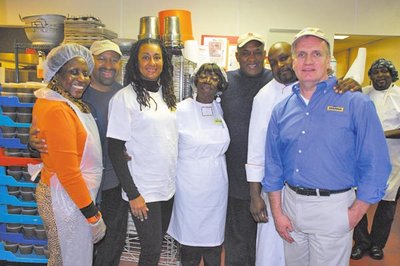The openly gay head of an agency that provides nutritional meals to those with HIV/AIDS and other illnesses announced this week that he will depart his post next year.
Richard Keaveney will step down as CEO of Metropolitan Area Neighborhood Nutritional Alliance in June 2013.
He has served as the chief of the agency for seven years and spent the previous six years as MANNA board president.
Keaveney, founder and chairman of Toppers Spa Salons, planned to only remain in the MANNA position for two years and then jump back into the business world, but the economy of the past few years made such a decision imprudent. However, Keaveney, 57, said the timing is now better.
“The collapse of the market in 2008 really prohibited entrepreneurs like myself to expand our businesses but, with the outlook somewhat brighter now, I would like to spend some time launching a new business model,” he said.
The timing for his departure is also suitable for MANNA, he said.
He agreed to take over operations at a time when the organization was floundering — it was operating with a half-million-dollar deficit, laid off a handful of employees and was aiming to expand its programs to clients dealing with diseases other than HIV/AIDS, without the corresponding funding.
“Morale was really low,” he said. “I like a challenge, and I was willing and able to take on the two-year contract. And we are now in a very strong financial position and overall in a very, very good place.”
When Keaveney came on as CEO, MANNA had an operating budget of less than $3 million annually with no substantial savings; its budget now stands at more than $4 million and the agency has accrued about $3 million in assets, much of which is earmarked for programmatic growth.
MANNA employed about 30 individuals when Keaveney was hired and now has a staff of about 35.
“Most of the positions we’ve expanded are in direct services,” he explained. “We had one nutritionist and now have three, and we had two chefs and now have four.”
The agency now employs two fulltime volunteer coordinators who oversee the work of its approximately 2,500 annual volunteers — a figure that was at about 1,500 when Keaveney started. MANNA has seen a substantial influx in the number of business and corporate groups that come in to volunteer, Keaveney added.
In June 2006, MANNA was able to expand its mission to include people suffering from all life-threatening illnesses, which is what Keaveney called one of his proudest achievements.
Also significant was when, a few years back, the agency was able to move from offering two meals five days a week to three meals all seven days, he said.
While the agency is in a much different place than it was when he took over, Keaveney said MANNA will need to work hard to maintain that position.
“What concerns me going forward is health-care reform and sustaining funding for our services,” he said. “I’m worried that support for HIV/AIDS programs and nutrition services could disappear in the next couple of years with Ryan White funding being threatened. MANNA has proven it keeps people out of hospitals, and the day eventually has to come where insurance companies and third-party providers would reimburse for part of what we do. So sustainable funding will be one of the biggest challenges coming up.”
But Keaveney said he’s confident that the staff in place will be able to weather those challenges.
“We’ve built a management team that should make my leaving MANNA a year from now not skip a heartbeat,” he said.
The search process for Keaveney’s replacement will begin immediately and will initially be an internal search, which is expected to wrap up by the end of the summer. Keaveney said he’s “cautiously optimistic” that a suitable candidate will be found within MANNA’s management team but, if not, the search would move outward.
Keaveney said he will remain a “strong donor” for MANNA and hopes to one day serve on the agency’s advisory board.

